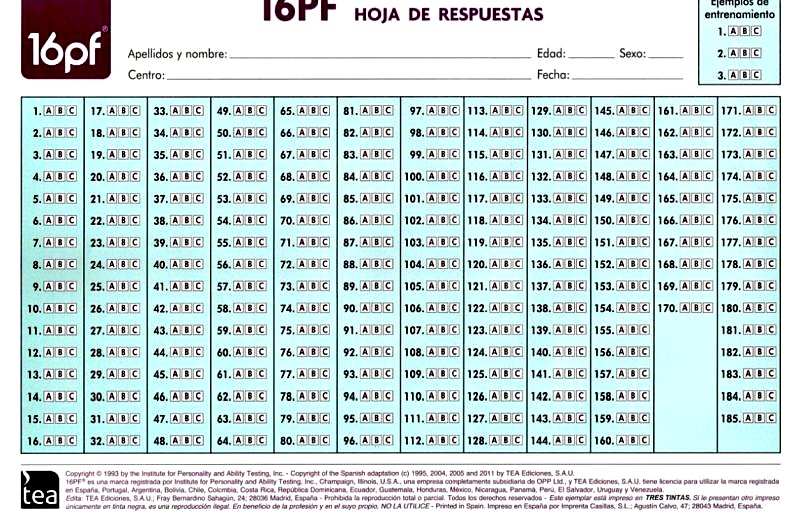
|
Home DH-Debate 2. Anxiety and Over-Confidence 4. Eysenck Type Personality Test |
A widely used personality test is the Cattell 16PF Scales (16 Personality Factors), and the tests developed from this.
Raymond Cattell began with a list of more than 18,000 words that described personality. He reduced this list manually to about 4,500 words and statements. Using factor analysis, he reduced further the list and found 16 "Personality Features" (PF), which describe human personality.
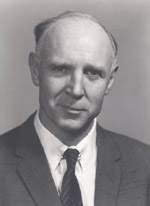
Raymond Cattell 1905-1998
On this basis, Cattell produced a standardized test that can be used to assess people's personality according to these 16 factors.
Factor analysis is a kind of correlation analysis with multiple variables. It measures the degree to which two variables are related by having a tendency to increase or decrease together. For example, if "frequency of exercise" and "blood pressure level" were measured on a large group of people, then inter-correlating these two variables would indicate the degree to which "exercise" and "blood pressure" are related to each other.
Factors which correlate will appear as "clusters". Words and statements that are different, but still covers the same meaning, are likely to have a close correlation and therefore will show up in the same cluster, and thus can then be reduced to a single statement.
Cattell defined personality as "that which permits a prediction of, what a person will do in a given situation."
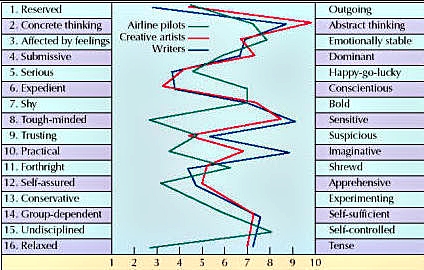
16PF Group profiles for pilots, artists and authors.
When the test is given to groups of people from the same profession, group profiles can emerge. For example, writers tend to be imaginative, while pilots are unsentimental, and artists are experimenting and thinking abstract.
Cattell had basically an engineering and mathematical approach to personality. He developed his test independently of the psychiatric hospitals. This distinguishes the 16PF test from the Eysenck, Rorschach and MMPI tests. Cattell test is from the beginning targeting normal persons, and it is not like the others designed to detect pathological mental deviations. One can say that it has a somewhat healthier approach to personality.
In the fifth edition of the 1993 Cattell 16PF Scales, the test taker answers 185 multiple choice questions, formulated in simple and non-alarming language.
Like the MMPI, 16PF contains some scales that indicate the quality of an answer.
The Impression Management (IM) scale is designed to reveal answers where the test person may have made himself better or worse than he is. A high score reflects a preponderance of socially desirable answers and a low score reflects a preponderance of socially undesirable responses. A high score may also be due to the fact that the test person has actually been honest, but has the answer based on his own self-image, which, however, does not have to be identical to his actual behavior. A low score on IM shows an unusual willingness to admit undesirable traits or behaviors and can happen when a test subject is unusually discouraged or under stress.
The Acquiescence (ACQ) scale measures the extent to which the test subject responds in the affirmative way to the statements, regardless of what is asked. A high score may indicate that the test taker has misunderstood the questions, answers randomly, has a vague picture of himself, or a primus optimus respons style in which he accepts everything that comes.

|
16PF test form - today one should probably expect a computer program. Photo: Hoja de respuesta 16 PF
The Infrequency (INF) scale detects test takers who show consistent indecision by clicking the middle b-answers many times and not the a- or c-answers. This may indicate that the test taker has difficulty understanding what is meant or is trying to avoid making a bad impression by choosing the middle answer rather than one of the more definitive answers.
Like most other personality tests, many of the questions are out of context. The classic example is "do you like sociability?" The test taker will think: what kind of sociability? Is it a rave party somewhere in the scary part of inner city, a noisy bar or or a barbecue party with good friends? An analytically minded test person will many times during the test feel frustrated because he has to make decissions on a lot of things without getting information about context and details. He may many times feel motivated to answer (b), which is the middle answer, indefinite or do not know.
Factor |
Low Score |
High Score |
||
|---|---|---|---|---|
|
A
|
Interpersonal warmth
|
Impersonal, distant, cool, reserved, detached, formal, aloof
|
versus
|
Warm, outgoing, attentive to others, kindly, easygoing, participating, likes people
|
|
B
|
Reasoning
|
Concrete-thinking, less intelligent, lower general mental capacity, unable to handle abstract problems
|
versus
|
Abstract-thinking, more intelligent, bright, higher general mental capacity, fast-learner
|
|
C
|
Emotional stability
|
Reactive emotionally, changeable, affected by feelings, emotionally less stable, easily upset
|
versus
|
Emotionally stable, adaptive, mature, faces reality calmly
|
|
E
|
Dominance
|
Deferential, cooperative, avoids conflict, submissive, humble, obedient, easily led, docile, accommodating
|
versus
|
Dominant, forceful, assertive, aggressive, competitive, stubborn, bossy
|
|
F
|
Liveliness
|
Serious, restrained, prudent, taciturn, introspective, silent
|
versus
|
Lively, animated, spontaneous, enthusiastic, happy-go-lucky, cheerful, expressive, impulsive
|
|
G
|
Rule-Conscious-
ness |
Expedient, nonconforming, disregards rules, self-indulgent
|
versus
|
Rule-conscious, dutiful, conscientious, conforming, moralistic, staid, rule-bound
|
|
H
|
Social Boldness
|
Shy, threat-sensitive, timid, hesitant, intimidated
|
versus
|
Socially bold, venturesome, thick-skinned, uninhibited
|
|
I
|
Sensitivity
|
Utilitarian, objective, unsentimental, tough-minded, self-reliant, no-nonsense, rough
|
versus
|
Sensitive, aesthetic, sentimental, tender-minded, intuitive, refined
|
|
L
|
Vigilance
|
Trusting, unsuspecting, accepting, unconditional, easy
|
versus
|
Vigilant, suspicious, skeptical, distrustful, oppositional
|
|
M
|
Abstracted-
ness |
Grounded, practical, prosaic, solution oriented, steady, conventional
|
versus
|
Abstract, imaginative, absentminded, impractical, absorbed in ideas
|
|
N
|
Privateness
|
Forthright, genuine, artless, open, guileless, naive, unpretentious, involved
|
versus
|
Private, discreet, nondisclosing, shrewd, polished, worldly, astute, diplomatic
|
|
O
|
Apprehension
|
Self-assured, unworried, complacent, secure, free of guilt, confident, self-satisfied
|
versus
|
Apprehensive, self-doubting, worried, guilt-prone, insecure, worrying, self-blaming
|
|
Q1
|
Openness to Change
|
Traditional, attached to familiar, conservative, respecting traditional ideas
|
versus
|
Open to change, experimental, liberal, analytical, critical, freethinking, flexibility
|
|
Q2
|
Self-Reliance
|
Group-oriented, affiliative, a joiner and follower dependent
|
versus
|
Self-reliant, solitary, resourceful, individualistic, self-sufficient
|
|
Q3
|
Perfectionism
|
Tolerates disorder, unexacting, flexible, undisciplined, lax, self-conflict, impulsive, careless of social rules, uncontrolled
|
versus
|
Perfectionistic, organized, compulsive, self-disciplined, socially precise, exacting will power, control, self-sentimental
|
|
Q4
|
Tension
|
Relaxed, placid, tranquil, torpid, patient, composed low drive
|
versus
|
Tense, high-energy, impatient, driven, frustrated, over-wrought, time-driven
|
Cattel's 16 Personality Features, Cattel and his colleagues conducted extensive international research with the aim of identifying and mapping all basic descriptions of personality. Their aim was systematically to map the widest possible range of personality concepts in the belief that "all aspects of human personality that are or have been of importance, interest or usefulness have already been recorded in language". It is the famous and infamous Lexical hypothesis that states that if there is a word for a concept, then it also exists.
Raymond Cattell then again used factor analysis on his 16 personality traits, and thus reduced them to the five second-order personality traits, which are called global personality traits. They also score in both directions:
Introvert / Extravert.
Emotional Stable / Anxious.
Receptive / Tough-minded.
Accommodating / Independent.
Unrestrained / Selfcontrolled.
Introvert/ Extravert |
Emotional Stable/ Anxious |
Receptive/ Tough- minded |
Accommo- dating/ Independent |
Unrestrained/ Self- controlled |
|
|---|---|---|---|---|---|
|
A
Interpersonal Warmth |
C
Emotional Stability |
A
Interpersonal Warmth |
E
Dominance |
F
Liveliness |
B
Reason |
|
F
Liveliness |
L
Vigilance |
I
Sensitivity |
H
Social Boldness |
G
Rule- consciousness- |
|
|
H
Social Boldness |
O
Apprehension |
M
Abstractedness |
L
Vigilance |
M
Abstractedness |
|
|
N
Privateness |
Q4
Tension |
Q1
Openness to Change |
Q1
Openness to Change |
Q3
Perfectionism |
|
|
Q2
Self- Reliance |
|
|
|
|
|
The five global 16PF factors.
It is seen in the first coulumn from the left, "Introvert/Extravert", that there are five basic 16PF factors that motivate individuals to approach others or create distance to others, namely A Interpersonal Warmth, F Liveliness, H Social Boldness, N Openness and Q2 Self-sufficiency. It is seen in the second coulumn from the left, "Anxiety/Emotional-Stability" that there are four basic factors that create anxiety namely C Emotional Stability, L Vigilance, O Apprehension and Q4 Tension, and so on.
Some 16PF factors have been used multiple times, while B Reason is not used in any global 16PF factor.
However, a complete personality test can be very extensive. Therefore most companies are said to prefer a simpler version, which gives them information about the personality features that they want to know something about, namely the three global scales:
Introvert / Extravert.
Emotional Stable / Anxious.
Receptive / Tough-minded.
Very few have a complete extravert or complete introvert personality. Most are somewhere in between. Persons are characterized on a scale between two extremes.
Highly extraverted persons are party lions, who get everything from others, attitudes, opinions as well as knowledge. They have a strong need for social contact all the time. They do not have any independent thoughts. As soon as they are alone they will immediately start to feel bored.

Extraverted person.
Extraverted people find it hard to concentrate on detailed work. They feel that the world goes past them, while they sit messing in these unimportant details.
Extraverted persons will react to stress by turning aggressive. One can say they try to solve the problems socially.
It goes without saying that many actors and politicians are very outgoing personalities, who are really good at social interaction. They simply can not stay away from the limelight.
Highly introverted people want to be left in peace to take care of their own projects and to think their own thoughts. It's not that they do not like social contact. Humans are social beings, and the introverted personalities are too. But they simply do not have the same desperate need for constant social interaction as the extraverts have.
The famous Danish physicist, Niels Bohr, was very introverted. It is said that when he gave lectures at the university, he could completely forget the students' presence. Now and then he stood with his back against the auditorium facing the blackboard and muttered something for himself, while he scratched some equations on the blackboard, which the students could not see.
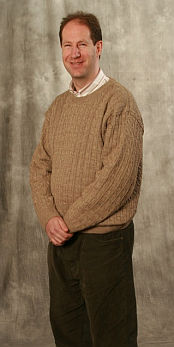
Introverted person.
Introverted persons have no problems with detailed work. They feel that detailed work is the first trench defence line against the cruel and merciless reality with its ruthless laws of nature.
Unlike extraverts, they will react to stress by withdrawing into themselves. They will, so to speak, try to solve problems individually. They will be more silent and absent-minded professor-like.
It is important not to confuse introversion with anxiety.
Introverted persons have their own inner strength because they have thought things through. They can withstand stress longer than the very extraverted persons.
One must of course score on introversion or extraversion depending on the position in question.
It is obvious that if you go for a job as a salesman, then you must score well on extraverted, and if you go for a position as a caseworker in an IT development firm, you must score on introverted.
Most people know the feeling of anxiety and nervousness in an exam situation.
The problem of overly anxious people is that they feel that they are in exam all the time. And not only that. They do not know what they are examined in. They feel they have lost track of their life.

A film poster for Kafka's The Process by Orson Welles - Spanish version.
In Kafka's novel "The Process" the main character Josef K is summoned for a court, which he never had heard about before. He is never told what he is charged for. He's just being informed that it is a very serious matter. He ends up realizing that there must be something about it, although he did not find out what was his crime. Eventually, he is executed by two polite gentlemen dressed in
black suits.
It must be something like that overly anxious people feel.
Woody Allen has represented the neurotic and overly anxious personality on film. He tries desperately to orientate himself in life and argue his way out of any responsibility.
Companies and human resources consultants will make considerable
efforts to weed out candidates with a high level of anxiety. It is one of the main purposes of a personality test.
It would be a disaster for a human resources company if they by mistake should recommend an applicant who later shows up to have problems with real anxiety. They will properly not take any chances in this regard. If there are any suspected high levels of anxiety, they will point on another candidate, regardless of the qualifications of the first applicant. The test report may be filed for years.

Excessive anxiety.
It is very important for candidates that they are able to identify statements that will score on excessive anxiety and as good as possible to avoid them.
Statements that scores on anxiety will be something with a certain flight from responsibility and the feeling that all the others, in reality, are much better than yourself.
A statement, that the reason for poor grades was nervousness, or that the teacher did not like you, will most likely score on anxiety.
A statement, that you have not received a fair treatment in connection with this and that, will certainly score on excessive anxiety.
A football coach can say, that it was not fair that his team lost the match, as they had the ball most of the time.
But the rules of football says loudly and clearly, that the team, that scores the most goals, is the winner. It says nothing about the quality of the artistic presentation. And this the coach knew in advance.
A tough-minded person is a self-confident person. It is not an either or. It can be described as a continuous scale from totally dominating to totally self-doubting.
Adolf Hitler and Mohammed must be assumed to have been one hundred percent dominant persons. They received a revelation early in their life and thereafter they had a patent on truth. They were completely sure that they were always right.

A very self-confident young businessman.
Completely dominating people are impervious to any form of logic, reasoning or empirical data. They may have heard about arguments and logic - in theory, but basically, they do not know, what it is good for. They already know the truth, why make it so complicated?
Mohammed did not have the slightest doubt, that the whole world in the very end would profess to his beliefs. Adolf did not have a shred of doubt that he would win. It was their extreme self-confidence, which gave them their impressive mental power over their followers.
Completely dominating persons spell binds their many supporters thanks to their intense ardent beliefs. They have only little use for actual arguments.
You will often see a kind of symbiosis between a highly dominant type and a large group of anxious and less self-confident persons. They need each other. The anxious persons feel that the dominant's unshakable certainty in all matters, gives them a fixed point in life, and the dominant needs to be admired and applauded. This short-circuits the organization, and analytical and constructive initiatives are suppressed.
Highly dominant types can be found everywhere. Adolf and Mohammed had some limited success, but it is not the rule. They see the light, seize the power in their union, parish, faculty, company or nation, and in sovereign contempt for the cruel merciless reality with its ruthless laws of nature, they lead their devoted followers and their entire organizations towards stagnation and defeat.
A self-confident and a less self-confident person got senseless drunk together. They went to a bar, threw off all their clothes and danced naked on the tables singing dirty songs.
The next day they could not remember anything. When the worst headache was gone, they met some of their friends, who told them about the evening's events.
The self-confident person gave a tough smile and shook his head. "My goodness. We were really that drunk?". Together with the night's spectators, he could laugh at the details.
The less self-confident nude dancer turned glowing red in his face, when he realized, what he had done. He turned around and ran back to his room. He locked his door from inside and did not come out the next several days.

A self-confident young businessman. Photo Twitter.
A self-confident person does not think that he has any personal secrets that the others may not know about. This means apart from passwords and this kind of stuff. He feels that he's actually very nice and clever and intelligent and everything. It can not hurt to show it a little. Well, he had really danced naked on the tables in a bar. I have better not do too often, he will think.
Highly self-confident people do not think there is any contradiction between what they think about themselves and what others think about them. They do not mind that others are interested in them.
A less self-confident person thinks that he has his own ways and quirks and his own thoughts. He fears that if others knew them, they would not accept him.
Most companies are interested in candidates, who have the confidence to take action as necessary. They must be able to deliver a speech and in all to represent the company in a dignified manner. But they are often afraid that very dominant persons will make troubles and irritate the customers.
Therefore, one should score of self-confidence, but with caution.
In 16PF, the test subject is expected to answer (a) for "true", (b) for "do not know" or (c) for "false".
Statements in 16PF are generally not easy to see through.
1. "I occasionally tell strangers things that seem to me important, regardless of whether they ask about them."
(a) scores most likely on "E Dominance" as it requires a certain aggressiveness to address strangers unsolicited. Moreover, probably on "H Social Boldness" for obvious reasons, the latter supporting the global scale "Introvert / Extravert" in this case Extravert.
2. "I find it embarrassing to have praise or complements bestowed on me."
(a) probably scores on "O Apprehension" and thus on the global scale "Emotional
Stable / Anxious" in this case anxiety. A (c) will score at the other end of the scale, "emotional stability".
3. "An evening with a quiet hobby appeals to me more than a lively party".
(a) scores safely on "F Lively" because of the words "Serious, silent". Which factor supports the global scale Introvert / Extravert. In this case, Introvert. A (c) would surely score on "cheerful, impulsive" and Extravert on the global scale.
4. "I would hate to be where there wouldn't be a lot of people to talk to."
(a) will surely score on "Q2 Self-sufficiency" in this case "group-oriented", on the global scale "Introvert / Extravert" it will then count clearly on Extravert.
5. "I make smart, sarcastic remarks to people if I think they deserve it. a. Generally b. Sometimes c. Never."
(a) contains a certain aggressiveness which points to "E Dominance", which supports the global scale "Accommodating / Independent" and thus independence.
6. "In carrying out a task, I am not satisfied unless even the minor details are given close attention"
(a) points to "Q3 Perfectionism" and thus to the global scale "Unrestrained / Self-controlled". In this case, self-control.
7. "I Learn better by: a. Reading a well written book b. In between c. Joining a group
discussion."
(a) points to "Q2 Self-Reliance", which supports the global scale "Introvert / Extravert" - most likely Introvert in this case.
8. "Which do you do in relation to your week-to-week personal expenditures?
a. Keep some sort of account. c. Never know what you have spent for sure."
(a) points to "Q3 perfectionism", which supports self-control on the global scale "Self-control / impulsive". A (c) may also be attributed to unworried in the factor "O Apprehension", which supports the global scale "Emotional Stable / Anxious", in this case emotional stability.
9. "I spend much of my spare time talking with friends about social events enjoyed in the past".
(a) match "group orientation" and thus scores on the factor "Q2 Self-sufficiency", which supports the global scale "Introvert / Extravert", here Extravert. A (c) will score on the same scales but opposite - on individualism and introversion.
10. "I am a fairly strict person, insisting on always doing things as correctly as
possible".
(a) scores fairly surely on "G Rule-Consciousness" and possibly also on "Q3 perfectionism", both of which support the global scale "Unrestrained / Self-controlled", in this case self-controlled.
11. "I am known as an "idea man" who almost always puts forward some ideas on a
problem"
(a) will point to "Abstract and imaginative," in the factor "M Abstractedness", which supports the global scale "Unrestrained / Self-controlled", in this case Unrestrained.
12 "Small things sometimes "get on my nerves" unbearably, though I realize they
are trivial."
(a) scores clearly on factor "O Apprehension", which supports the global scale "Emotional
Stable / Anxious", in this case anxiety.
Some standard questions that are not specific to 16PF but can be found in most tests in different versions and with different features:
1. "Would you wish that you were more persuasive?"
A yes scores certainly on less self-confident.
2. "Do you find it hard to make you feel embarrassed?"
Highly self-conscious people will not get embarrassed. No matter what they do or say, then it is just right. A yes scores surely on self-confidence.
3. "Are you always open and honest about your feelings?"
Imagine that you are visiting a customer and that you basically feel that he is an overweight windbag. Would you then be open and honest about your feelings? You probably would not.
Imagine that you join a party together with your wife. One of the other female guests has a low-cut that exposes a good part of her rather big attributes. It arouses some of your deeper animal emotions. Would you then be open and honest about your feelings? Well, it is not wise.
We must assume that if the issue is on: "Are you always open and honest .." then it is a test question, which should detect cheaters, and we should answer no.
But if the question is, whether you, in general, are open and honest about your feelings, you can answer yes and thereby score on self-confidence.
4. "Do you think that most people are more aggressive and self-confident than you are?"
It is quite clear that a yes scores on less self-confident and a no scores on self-confident.
5. A type of question is if our friends or colleagues believe that you belong to this and that type, followed by some options.
Later there may come a question whether you believe you are of this and that type then follows the same choices worded a little differently and in a different order.
Here we must remember that self-confident persons feel no real difference between, what their friends think, and what they think themselves. Less self-confident persons, however, have secrets.
6. Are you a perfectionist?
A candidate in his right mind can not answer yes to something like this. Thus you would tell that you are a person that can never complete your tasks. It is not your fault, because you're a
perfectionist. It would surely score high on anxiety! Some psychologists believe that pronounced perfectionism is caused by some kind of a basic sense of inferiority.
Of course we all would like to do our job properly. So if the question about perfection occurs in connection with a scale, for example from 1 to 5, one can choose 1 or max. 2 if the position in question is a sort of caseworker or specialist.
7. Do you like to talk to strangers?
It is easy to see that a yes scores on extraversion, and no scores on introversion.
8. Do you like detailed work?
Yes scores on introverted and no on extraverted?
9. Do you find it easy to concentrate on such work as proofreading?
A yes scores on introverted and a no on extraverted.
10. Have you ever spoken untrue?
Everybody lies a little now and then.
11. Do you easily get bored?
Of course, a yes scores on extraverted and a no on introverted.
Raymond Cattell was born in England in 1905. In 1937 he was invited to Columbia University in the United States as a professor of Psychology, then he came to Clark University and later to Harvard. During World War II, he made a test for the selection of Officers for the U.S. military. Immediately after the war, he developed his Sixteen Personality Factor Questionnaire, which quickly became a huge success. In 1949, he founded his company, the "Institute for Personality and Ability Testing", which had the purpose to develop and market the test.
An important element of his theory is that the 16 Personality Features can be grouped into 5 global scales, each of which is determined by 4-5 of the basic 16 Personality Features.
Probably motivated by the great success of the 16PF test, other similar models have entered the market for personality tests. The best known of these is the Big Five, which was created by the Americans, Paul T. Costa Jr. and Robert R. McCrae, and marketed around 1970. It is very similar to 16PF, also defining 5 main scales, each of which is determined by 4 basic scales.
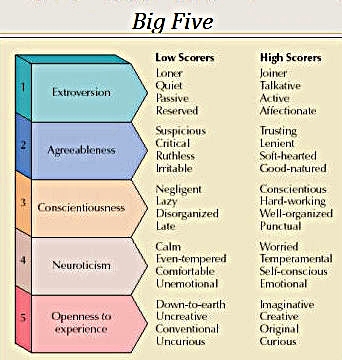
Big Five model of personality. The five main scales are each determined by 4 basic scales.
In 1970, many human resources consultants felt that Cattell's 16 factors were too many. Tests became too extensive and too expensive. On the other hand, Eysenck's three factors were too few, and did not provide enough description, they thought. Therefore, Cattel's five second-order global personality traits were further developed into various five-factor models, of which the "Big Five" is the most important.
The five main scales in Costa and McCrae's Big Five model are::
1. Introvert / Extravert
2. Agreeableness / Irritable
3. Conscientious / Unreliable
4. Neurotism / Emotional Stable
5. Open to Experiments / Conventional.
Extroverted is identical to Eysenck's extroverted. Eysenck's psychotism, however, is represented by two factors in the Big Five model, namely agreeableness and conscientiousness, it is said. Cattel's anxiety is quite close to Eysenck's and Big Five's neuroticism.
|
Online Cattell-16PF personlighedstest Similar Minds. Personality Tests Online Personality Tests. Online Big Five Personality Test Queendom 16PF Questionnaire Wikipedia. Online Big Five Personality Test Queendom A shortened "Basic English" version (form C) of the 16 PF Questionnaire University of Illinois "The Cult of Personally Testing" af Annie Murphy Paul - Free Press - Simon and Schuster Inc. |
| To top |